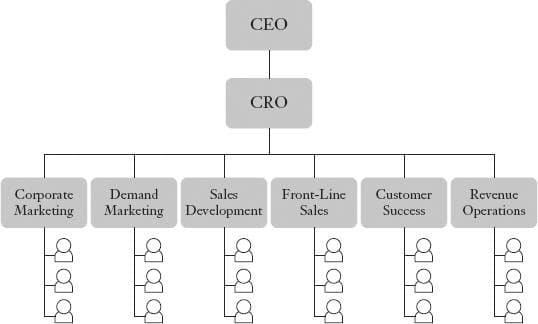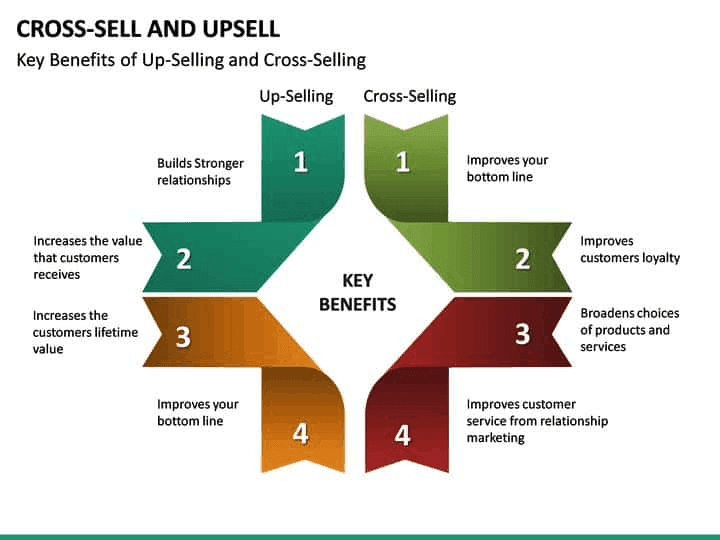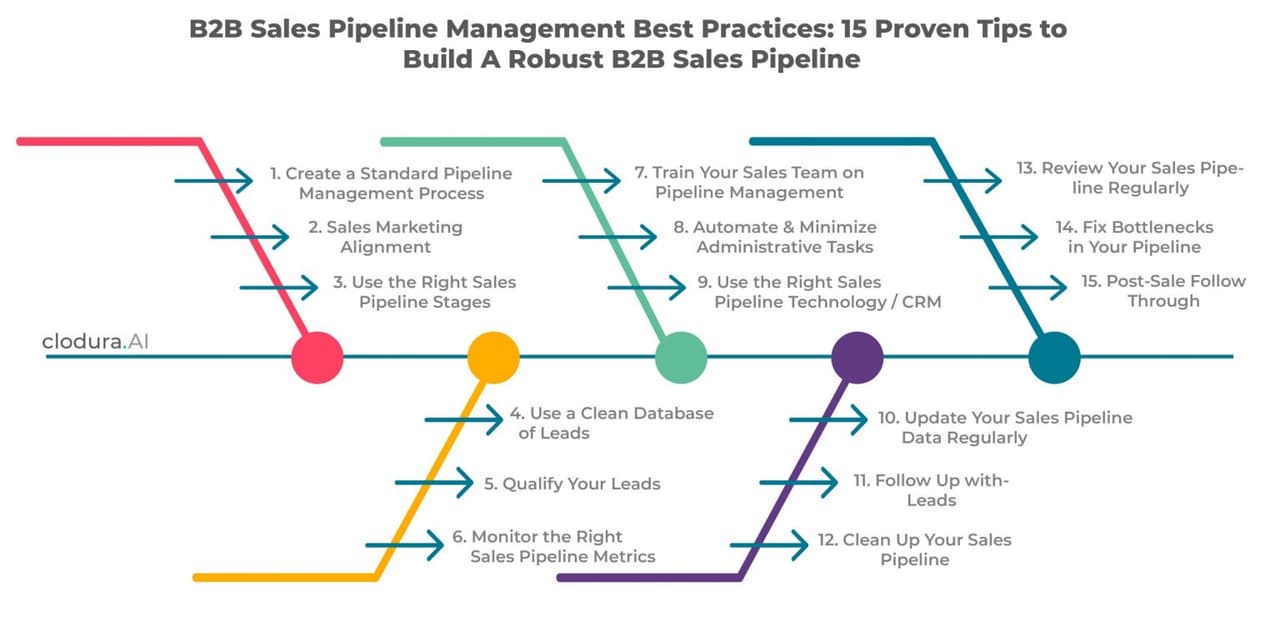What Is a Chief Revenue Officer, and Should You Hire One?
Casey O'Connor
The role of chief revenue officer has become more popular and increasingly more necessary in recent years. The chief revenue officer (CRO), put simply, is in charge of aligning and managing the various people, processes, and technology that aid in generating a company’s revenue.
In this article, we’ll go over the basic job description of a chief revenue officer, as well as what makes this role different from that of a sales or marketing leader. We’ll also discuss whether or not your company needs one, and how to know it’s the right time to put one in place.
Here’s what we’ll cover:
- What Is a Chief Revenue Officer?
- What the Chief Revenue Officer Is Responsible for
- How a Chief Revenue Officer Is Different Than a Sales or Marketing Leader
- How to Know If Your Company Needs a CRO
- Chief Revenue Officer Job Description Template
What Is a Chief Revenue Officer?
A chief revenue officer is in charge of aligning, overseeing, and optimizing the various departments, strategies, and activities that contribute to generating revenue for a business.

For most companies, this means the CRO primarily works with sales and marketing. Some chief revenue officers may also oversee customer success teams.
In terms of an organization chart, the CRO is typically ranked above these three teams, and reports above him to the CFO or CEO.

The CRO role has been around for decades but did not become popular or mainstream until the sales world started tapping into new digital streams of income. The chief revenue officer is especially important for SaaS businesses.
The chief revenue officer’s primary job is to create optimized selling processes and successful collaboration between all of the departments that have a hand in generating revenue.
They aim to do so with an eye towards the customer, aligning the revenue cycle with the buyer’s journey and perspective.

What the Chief Revenue Officer Is Responsible For
A chief revenue officer has many roles and responsibilities.
Some sales professionals consider the CRO to be a kind of “growth hacker.” They are tasked with:
- Studying and optimizing the teams’ current processes
- Uncovering new and untapped potentials for expansion
- Harmonizing the activities of the various stakeholders in the sale cycle to create a process that speaks directly to the customer’s needs within the buying process
Ultimately, the job of the CRO is to scale revenue in a meaningful, robust, and repeatable way.
Align Teams
One of the overarching goals of the CRO is to create a unified, holistic approach to customer interactions. The rise in content marketing has blurred the line between marketing and sales; the CRO enables the harmonization of the two teams’ efforts.
 The CRO can create a standardized outreach plan for both new and existing clients. This will empower sales and marketing to reach out to the right people at the right time for maximum customer success.
The CRO can create a standardized outreach plan for both new and existing clients. This will empower sales and marketing to reach out to the right people at the right time for maximum customer success.
Maintain Relationships
It’s also the job of the chief revenue officer to maintain excellent relationships with target accounts. This might mean managing the follow-up on their own, or it could look like close interaction with the customer success team.
CROs may also participate in contract negotiations with high-value accounts.
One of the CRO’s primary responsibilities is to keep his finger on the pulse of buyer interactions. By studying the efficacy of the many buyer touchpoints throughout the sales process, the CRO can reverse-engineer a highly optimized sales funnel that preemptively speaks to the needs of the ideal buyer.

It’s said that salespeople are responsible for the close, but CROs are responsible for the next 10 years of that customer’s contribution to the company’s bottom line.
Strategy
The CRO has an active role in developing short-term and long-term sales strategies. They are responsible for overseeing channel and partner development and should be major contributors to accurate and reliable sales forecasting.
New Business
The CRO is directly responsible for identifying and analyzing potential opportunities for new revenue streams. This might mean:
- Designing a plan for expanding your company’s territories
- Developing a new product offering
- Identifying opportunities for digitizing a new or existing offer
Put simply, a CRO needs to be able to skillfully and consistently identify and strategize around opportunities that can be converted to sales and, ultimately, translate to more revenue.
Old Business
The chief revenue officer also manages existing clients, both to ensure their satisfaction and to tap into new revenue streams within.
They might, for example, work to optimize the sales team’s cross-selling, upselling, or referral efforts by offering training or workshops.

New customer acquisition is anywhere from five to twenty-five times more expensive than retention of and cross-selling/upselling to existing customers, so this is an extremely important skill for a CRO.
Pipeline Management
Another role of the CRO is to develop and implement robust sales management processes.
There are a tremendous number of things that go into pipeline management.

Not all of these processes necessarily fall under the direct and/or sole responsibility of a CRO; he is, however, responsible for overseeing these various processes and ensuring that sales leaders are thoughtfully performing and reporting on the tasks outlined above.
Numbers
A successful chief revenue officer needs to have incredibly strong financial analytical skills.
One of their primary responsibilities includes creating a system of accountability that’s aligned with the specific metrics, KPIs, and goals of your company, and designing a compensation plan that motivates sales reps to perform accordingly.
They also need to be intimately familiar with the overall budget and allocate relevant resources for revenue-generating teams.
Finally, they need to approach these tasks with an eye toward identifying existing gaps and increasing revenue.
Executive Communication
A CRO needs to be just as comfortable in the boardroom as they are with the sales and marketing teams. He needs specific communication skills to act as a bridge between c-suite executives, VP of sales or chief marketing officer, and lower-level reps on each team.
Mindset
One of the underlooked aspects of a CRO’s job is to foster an environment of continuous learning. The CRO is tasked with constantly refining the revenue cycle, so it makes sense that he will be in charge of implementing changes and tweaks to the process over time. This can be a tough pill to swallow for overworked salespeople.
The chief revenue officer should model and instill a growth mindset, where experimentation and even mistakes are allowed and even encouraged for the sake of improvement.

How a Chief Revenue Officer Is Different Than a Sales or Marketing Leader
Many people confuse or conflate the roles of chief revenue officer and sales or marketing leaders.
Despite some overlap between them, the roles are decidedly different.

The VP of sales or other sales leader oversees the sales team. They ensure their sales reps achieve their quotas and meet overall targets.
The CRO, on the other hand, is in charge of the entire revenue operation.
In other words, the CRO is responsible for building the bridge between long-term revenue strategy and day-to-day execution of said strategy within the sales and marketing teams. They are in charge of making sure everyone in the organization has the information, direction, resources, and support to carry out the strategy.
How to Know If Your Company Needs a CRO
A chief revenue officer is important for any large or growing business. That being said, it’s more of a “big picture” role, and not every company may have the resources available or even the need for filling the role imminently.
Here are a few cues that indicate your company might benefit from a dedicated CRO sooner than later.
Sales and Marketing Are Misaligned
If you’re beginning to notice in-fighting or mismatched messaging within or between sales and marketing, it’s absolutely time to start carving out resources for a CRO.
The CRO will immediately run an audit of available content and resources, and compare them against your messaging and strategy. They will work to create consistency between the various resources and departments at our company for streamlined and efficient revenue growth.
C-Suite Lacks Sales Skills or Knowledge
If the executives at your company are really great at industry-specific stuff — engineering, for example — but clueless about how to sell it, a CRO can help.
This is a common issue among many tech, SaaS, and enterprise companies. C-suite executives are experts at their subject matter, but lack the skills to bring it to market in a persuasive way. The CRO can help bridge that gap and enable your sales team to convey your value proposition in a way that’s true to the product and relevant to the customer.
Profits Are Flat
Some sales leaders find themselves in the perplexing position of hitting targets, but not seeing any growth.
If your salespeople are meeting their quotas, and you feel like you can’t possibly optimize the sales process any further, yet profits are still somehow falling flat — it’s time to call in a CRO. They can help you explore untapped avenues that will generate new, lucrative revenue streams.
Chief Revenue Officer Job Description Template
Someone who holds the job title of chief revenue officer should possess the following qualities, regardless of their other skills and training:
- Ambitious and self-initiating
- Passionate and energetic
- Strong critical thinking skills
- Goal-oriented
- Maturity
- Strong interpersonal & communication skills
The following CRO job description template was adapted from LinkedIn.
Job Description
At [Company X], we expect our executive team to solve challenging business problems with creativity and passion. We are looking to onboard a new Chief Revenue Officer (CRO) to join us in this mission, with a focus on strategic planning, product development, marketing, branding, and partnerships, while ultimately strengthening and optimizing processes and operations. You will also be a key player in creating future strategic plans, with the primary goal of boosting revenue streams.
Objectives
- Collaborate with the executive team to execute the current corporate strategic plan, and to develop future plans.
- Monitor and create accountability systems for the performance, strategy, and alignment of the organization’s revenue-generating departments.
- Share accountability with the marketing department for improving the individual customer experience and strategy.
- Help maximize market reach and efficiency by adding new, scalable partners in a strategic way.
- Monitor the revenue pipeline and leads, adjusting as necessary to create scalable and sustainable growth.
Responsibilities
- Monitor the marketplace and analyze opportunities, providing competitive analysis, strategies, and tactics.
- Stay well-connected with customers to ensure broad market needs are being incorporated into the product development and enhancement cycle.
- Collaborate with finance, product management, and marketing on messaging, pricing, and strategies.
- Identify and resolve issues across the marketing/sales and account management/customer success functions.
- Participate in contract negotiations as needed.
Required Skills & Qualifications
- [X] years in leadership roles, especially those with attention toward driving and implementing revenue growth
- Proven track record of growing revenue through new product development, marketing, branding, and partnerships
- Proven experience crafting and executing business strategy
- History of decision-making based on business metrics
- Inspirational leadership style and hands-on approach
- Strong technology skills, especially those needed for CRM management and implementation of other sales enablement software
Preferred Qualifications
- Strong technical experience with Salesforce and other commercial tools
- MBA — or equivalent advanced degree
Get sales tips and strategies delivered straight to your inbox.
Yesware will help you generate more sales right from your inbox. Try our Outlook add-on or Gmail Chrome extension for free, forever!
Related Articles
Casey O'Connor
Casey O'Connor
Casey O'Connor
Sales, deal management, and communication tips for your inbox

